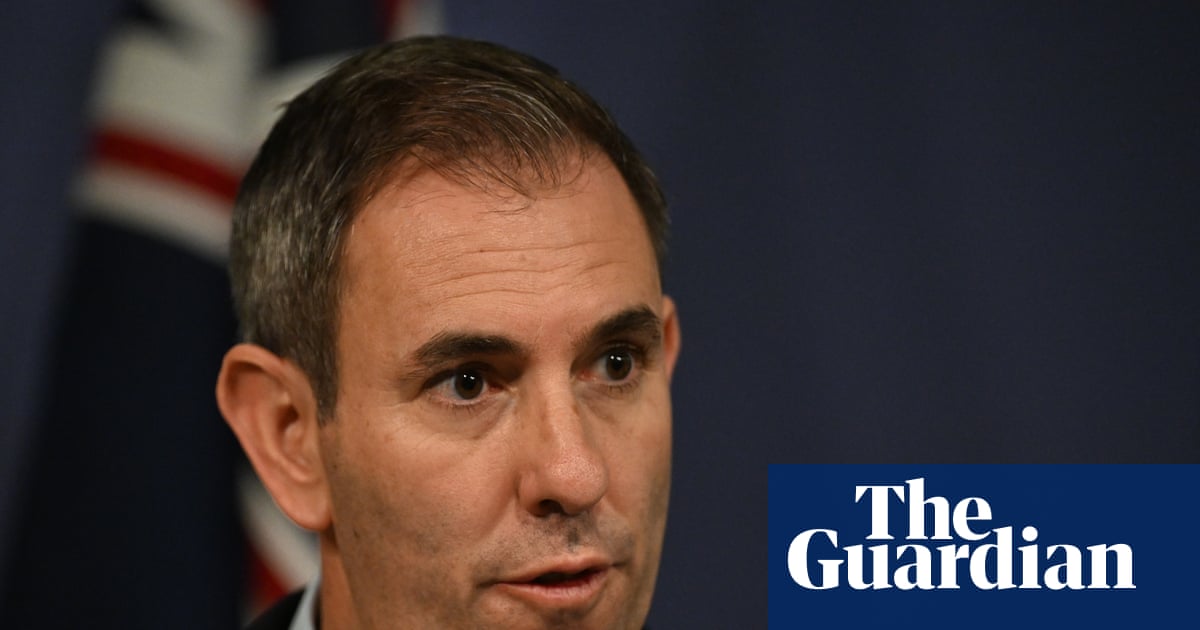The Coalition has likened next week’s economic reform roundtable to Charlie and the Chocolate Factory, as it challenges Labor to reject proposals which would increase taxes or make it harder to run a business.
The shadow treasurer, Ted O’Brien, the opposition’s sole representative at the event, will use a speech to a Liberal-aligned thinktank to dub the treasurer, Jim Chalmers, “Australia’s candy man” – a reference to Willy Wonka, Roald Dahl’s famous character who awards golden tickets for a visit to his factory.
Sign up: AU Breaking News email
O’Brien will tell the Menzies Research Institute on Friday that Labor needs to show economic leadership to spur growth and lift living standards.
He will seize on leaked Treasury advice which showed the government has prepared pre-determined outcomes for the summit, including new AI rules and a pause on changes to the national construction code.
Reforms designed to clear a backlog of 30,000 housing approvals held up by consideration under environmental laws are also outlined in the cabinet document, reported by the ABC.
“It looks like the roundtable has been engineered to rubber stamp a doubling down on Labor’s failed tax and spend strategy,” O’Brien will say.
“Let me be crystal clear: the Coalition will be no such rubber stamp. And we reject any suggestion Labor has a mandate to hike taxes.”
Despite taking part, O’Brien calls the meetings a “privileged talkfest”.
“We in the Coalition have already started our own process of formulating a new economic agenda to take to the next election, and we will take the time to get it right,” O’Brien will say.
Anthony Albanese has sought to manage expectations, warning the roundtable meeting “isn’t a substitute for government decision-making” and that the only tax policies Labor would implement in this term were modest changes put to voters before the 3 May election.
The prime minister said the event was about considering ideas which could inform next year’s federal budget or future legislation.
“If you think you’re the smartest in the room, you’re in the wrong room,” Albanese said during a visit to Queensland on Thursday.
“We’re awaiting the forum, and ideas will then come through normal government processes. That’s how good policy happens.”
The Greens have also made demands, urging Labor to make commitments on universal childcare.
Their early childhood education spokesperson, Steph Hodgins-May, wrote to Chalmers on Thursday calling for all families to be able to access affordable and high-quality early learning.
after newsletter promotion
The Victorian senator said such a move would improve living standards, boost workforce participation and strengthen economic resilience.
“A shift to a universal, low-cost, high-quality early learning system would be a gamechanger for families, children and the economy,” she said.
“The childcare subsidy model and market-driven approach make early learning inaccessible and unaffordable for many families, and clearly fails to guarantee safety or quality.”
Guardian Australia revealed this week Labor has commissioned consulting firm Deloitte to help design a universal childcare system, launching a two-year study of demand and costs.
It could lead to the introduction of a $10 flat fee for childcare services.
Work by the Productivity Commission suggests such a move would increase the total hours of work by single parents and secondary earners with young children by nearly 3% – the equivalent of about 17,000 additional full-time workers.
The childcare subsidy will cost the budget about $16.2bn this financial year, and is slated to rise to $18.4bn by 2028-29. With growth of about 5.5%, it is one of the big budget measures growing faster than nominal GDP.
The teal independent Allegra Spender said a reduction in income taxes on wages was badly needed, to help younger Australians get ahead. She proposed a dual income tax system, where income from labour would be taxed separately to income from investments.
“Australia’s focus on income tax from wages means that people are contributing the bulk of their lifetime tax at precisely the moment when they have the most expenses: saving for or paying down a record-high mortgage, putting children through childcare and school, while also trying to save for a retirement,” the Wentworth MP said.
“As Ken Henry said, if you wanted to design a tax system to punish young people, you’d arrive at something pretty similar to what we have now.”
